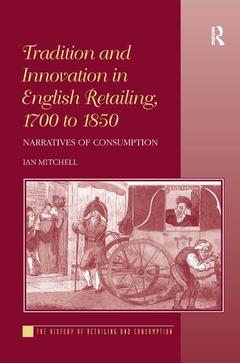Description
Tradition and Innovation in English Retailing, 1700 to 1850
Narratives of Consumption
Author: Mitchell Ian
Language: English
Subjects for Tradition and Innovation in English Retailing, 1700 to 1850:
Keywords
long; eighteenth; century; northgate; street; linen; draper; urban; retailers; manchester; Anti-Corn Law League Bazaar; Iron Gate; Tea Pots; Young Man; Gilt Edges; St John’s Market; Town Hall; Northgate Street; Eastgate Street; Sheffield Archives; Eighteenth Century Retailers; Jon Stobart; Linen Draper; Market Halls; Shoe Warehouses; Sugar And Spice; Latest London Fashions; Licensed Hawkers; Grand Bazaar; Charity Bazaars; St Andrew’s Street; North Hampshire; Fixed Shop Retailing; Kedleston Hall; Bazaar Markets
Publication date: 02-2014
Support: Print on demand
Publication date: 09-2016
· 15.6x23.4 cm · Paperback
Description
/li>Contents
/li>Biography
/li>




